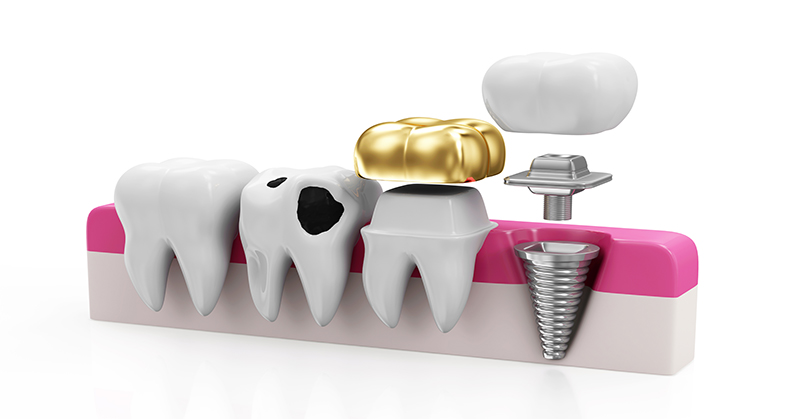Why Are Implants So Expensive?
According to recent statistics, tooth loss is a prevalent issue, especially among older individuals. Adults between the ages of 20 to 64 have an average of 25.5 remaining teeth. However, factors such as age, smoking, lower income, and education level can contribute to a higher likelihood of tooth loss. In this article, we will explore dental implants in detail through the following aspects:Do You Know All These Different Types of Implants?
updated on November 15, 2023
In the field of dentistry, dental implants have revolutionized the way we approach tooth replacement. With their durability, functionality, and aesthetic appeal, dental implants have become the go-to solution for individuals with missing teeth. However, not all dental implants are created equal. There are various types of dental implants, each with its own unique characteristics and applications. In this comprehensive guide, we will explore the different types of dental implants and the techniques used for their placement.
Types of Dental Implants
-
Endosteal Implants
Endosteal implants are the most common type of dental implants. These implants are directly placed into the jawbone, serving as artificial tooth roots. Typically made of titanium, they resemble small screws. Endosteal implants can support a single tooth restoration or act as anchors for dental bridges or dentures. Due to their high success rate, durability, and natural appearance, endosteal implants are widely favored by both patients and dental professionals.
-
Subperiosteal Implants
Subperiosteal implants, on the other hand, are placed on or above the jawbone, but beneath the gum tissue. They consist of a metal frame with posts that protrude through the gums to hold the artificial teeth. Subperiosteal implants are suitable for individuals with insufficient jawbone height or those who are unable to undergo bone augmentation procedures. This type of implant provides a viable solution for patients who do not have the bone density required for traditional implants.
-
Zygomatic Implants
Zygomatic implants are designed for individuals with severe bone loss in the upper jaw, where traditional implants cannot be placed. These implants are anchored in the cheekbone, also known as the zygomatic bone. By utilizing this alternative location, zygomatic implants provide stability for dental restorations, allowing patients with compromised bone structure to regain their smile and oral function.
-
Dental Implant Techniques
-
Traditional Implant Placement
The traditional implant placement technique involves a two-stage surgical procedure. In the first stage, the implant is carefully placed into the jawbone, and the gum tissue is stitched closed to allow for proper healing and osseointegration. After a healing period of several months, a second surgery is performed to expose the implant and attach an abutment. Finally, an artificial tooth or crown is securely attached to the abutment. This technique is highly reliable and has been used successfully for many years.
-
All-on-4 Implants
The All-on-4 implant technique is a revolutionary approach to full arch restoration. With this technique, four implants are strategically placed in the jawbone, maximizing the available bone density. A fixed dental bridge is then attached to the implants, providing a stable and functional set of teeth. One of the significant advantages of the All-on-4 technique is the immediate placement of a temporary prosthesis on the same day as the implant surgery, allowing patients to leave the dental office with a brand-new smile.
-
Immediate Load Implants
Immediate load implants, also known as "teeth in a day" or "same-day implants," offer a streamlined solution for tooth replacement. This technique involves the placement of the implant and the attachment of a temporary dental prosthesis immediately after the implant surgery. With immediate load implants, patients can enjoy functional teeth on the same day, eliminating the waiting period for healing and prosthesis placement. However, not all cases are suitable for immediate load implants, and an evaluation by a dental professional is necessary to determine eligibility.
-
Mini Dental Implants
Mini dental implants, as the name suggests, are smaller in diameter compared to traditional implants. They are primarily used to stabilize dentures or support single-tooth restorations in areas with limited space. Due to their smaller size, mini dental implants can often be placed with a minimally invasive procedure, resulting in a faster and more comfortable recovery. However, it's important to note that mini dental implants may not be suitable for all cases, and a thorough evaluation by a dental professional is essential.
-
FAQ - Frequently Asked Questions
1. How long do dental implants last?
Dental implants are designed to be a long-term solution for tooth replacement. With proper care and maintenance, dental implants can last a lifetime. However, it's important to note that individual factors such as oral hygiene practices, overall health, and lifestyle habits can influence the longevity of dental implants.
2. Are dental implants painful?
During the implant placement surgery, local anesthesia is used to ensure a pain-free experience. After the surgery, some discomfort and swelling may occur, but it can be managed with over-the-counter pain medication and following post-operative instructions provided by the dental professional. The majority of patients report minimal pain during the dental implant process.
3. Can anyone get dental implants?
In general, most individuals who are in good overall health and have sufficient bone density in the jaw can be candidates for dental implants. However, certain medical conditions, such as uncontrolled diabetes or active gum disease, may affect the eligibility for dental implant surgery. A thorough evaluation by a dental professional is necessary to determine if dental implants are the right option for you.
Conclusion
Dental implants offer a reliable and long-lasting solution for individuals with missing teeth. Understanding the different types of dental implants and techniques used for their placement is essential in making informed decisions about tooth replacement. Whether it's endosteal implants, subperiosteal implants, zygomatic implants, traditional implant placement, All-on-4 implants, immediate load implants, or mini dental implants, there is a suitable option for every patient's unique needs. Consultation with a dental professional is crucial in determining the most appropriate treatment plan.
Be sure to visit our website for more information on dental implants and to schedule a consultation with our experienced team of dental professionals.

free&low-cost dental clinics
View Now
dental health

Dental Implants

Dental Implants
Will Your Insurance Cover Dental Implants?
Dental implants are growing in popularity, with over 3 million Americans choosing them to replace missing teeth. While implants fuse securely into the jawbone providing natural-looking and long-lasting tooth replacements, the process does come with a hefty price tag. On average, a single implant can cost $1,600-$2,200 out of pocket. For patients needing multiple implants or other restorative work, these expenses quickly add up.
Dental Implants
Does Medicare Cover Dental Implants in 2024?
Medicare is an essential service for seniors, covering critical aspects of healthcare such as hospital stays, hospice care, and doctor services. However, when it comes to dental implants, a procedure known for its high costs, many beneficiaries find themselves questioning their coverage options. If you're contemplating this procedure, it's vital to know whether your plan offers coverage. This article aims to shed light on the coverage of dental implants under Medicare, focusing on Medicare Advantage plans.
Dental Implants
Do You Know All These Different Types of Implants?
In the field of dentistry, dental implants have revolutionized the way we approach tooth replacement. With their durability, functionality, and aesthetic appeal, dental implants have become the go-to solution for individuals with missing teeth. However, not all dental implants are created equal. There are various types of dental implants, each with its own unique characteristics and applications. In this comprehensive guide, we will explore the different types of dental implants and the techniques used for their placement.
Dental Implants
How to Find Dental Implants for Low Income
Dental implants are popular and effective solutions for replacing missing teeth. However, they can be quite expensive. For instance, one single implant can cost about $1500 in the US.If you're looking for ways to make dental implants more affordable, this article will provide you with five practical strategies to save on cost.
Dental Implants
How Can I Get Government Grants for Dental Implants?
Dental implants are a sought-after solution for missing teeth, offering a long-term fix that can significantly improve quality of life. However, the cost of dental implants can be prohibitive for many. Understanding government programs and other grants available for dental care, particularly dental implants, can help bridge this financial gap. In this guide, we will walk you through some government assistance and grant programs aimed at making dental implants more accessible.







